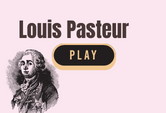Louis Pasteur Interesting Facts Game Quiz Online
This page features a Louis Pasteur Interesting Facts Game Quiz Online. It is a great exercise for students in 3rd to 9th grades. He was a microbiologist and chemist. He introduced the idea of pasturization which is a method used to preserve beer and milk. Learn about Pasteur through this interactive online game.

This article will explore the life of Louis Pasteur, a microbiologist and chemist who founded bacteriology. His contributions to medical science include the development of vaccines and microbial fermentation. In addition to advancing bacteriology, Pasteur also created a vaccine against rabies. However, not all of Pasteur's innovations are credited to him. Fortunately, his scientific achievements did not end there.
Pasteur was a French chemist and microbiologist
During the nineteenth century, Louis Pasteur was an important figure in the field of microbiology. He discovered many pathological microbes and proposed ways to prevent their spread in the body. Using his discoveries, Pasteur developed antiseptic techniques, and his research eventually led to the development of vaccines for many diseases. He also made breakthroughs in chemistry, including the discovery of tartaric acid and the resolution of optical isomers.
Pasteur's contributions to science are unparalleled. He pioneered the study of molecular asymmetry, discovered how to prevent bacterial growth, and helped prevent the spread of infectious diseases through the development of antimicrobial drugs. He discovered that microorganisms cause disease and fermentation, and developed a method for pasteurizing milk to stop it from spoiling. In the process, he saved the milk and beer industries in France. He also discovered the cause of anthrax and developed a vaccine for the diseases.
He was a founder of bacteriology
He became aware of diseases caused by microorganisms when he experimented with sugar beets and yeast. In 1857, Pasteur published his Memoir on Lactic Fermentation, which is widely considered the first scientific study on bacteriology. Despite Pasteur's success, the science of bacteriology was far from complete, but it did pave the way for future research and discoveries.
Throughout the 1840s, Pasteur conducted a number of microbiological experiments to better understand how bacteria cause diseases. He studied milk, cheese, milk, silkworms, vinegar, and beer to understand the role microbes play in these everyday items. During the Franco-Prussian War of 1870, Pasteur was recognized as an ace doctor and the "rock star" of bacteriology. His efforts led to a national hero status for France.
He discovered a vaccine for rabies
In 1885, 63-year-old French scientist Louis Pasteur discovered a vaccine for rat rabies. Despite his reservations about using animals in his experiments, Pasteur was determined to find a treatment for rabies. Pasteur first used rabbits as experimental subjects for his experiments, but the results were largely inconclusive. He used the brains of rabid animals to develop his vaccine. The rabbits recovered survived the disease.
Despite his concerns, Pasteur's experimental treatment for rabies saved a young boy named Joseph Meister from death by rabies. Initially hesitant to administer the vaccine, Dr Joseph Grancher convinced Pasteur to give the boy the vaccination. The young man was told that if the vaccination wasn't done, he would die. Despite the risk, Pasteur gave the boy 12 injections of rabbit spinal cord extract and a 14-day desiccation process to cure him of the disease.
He was a veteran of the Napoleonic wars
As a child, Louis Pasteur was an average student. However, he excelled in painting and drawing. In 1840, he completed a bachelor's degree in arts and science from the College Royal de Besancon. After graduating from college, he entered the Ecole Normale Superieure in Paris, where he received a Bachelor of Science degree. He then went on to become an associate professor at the University of Paris.
After his scientific discoveries, Pasteur traveled to many places around the world. His work in this field is still considered a revolutionary breakthrough. But Pasteur had other reasons as well. He had a passion for public health and the importance of science. He was an ardent advocate of the use of animal-based vaccines. He helped revolutionize the farming industry and even saved lives. He spent time studying other infectious diseases, especially cholera.
He suffered a brain hemorrhage
Although Pasteur never received a medical degree, he did become a member of the French Academy of Medicine. This honor was well deserved. He solved a problem that plagued mankind for years, namely cholera. His discovery laid the groundwork for the next great theoretical advance. Pasteur believed that many diseases were caused by germs, microbes that enter the human body and multiply.
In his early life, Pasteur was not well educated. His father, who had little education, wanted him to become a teacher at the local lycee, and thus he received little formal education. After attending a local lycee, Pasteur was considered an average student. However, he showed talent as an artist and applied to the prestigious Ecole Normale Superieure. By the time he was 19, he had won all of the school's awards and prizes.
He died in his arms
In 1865, the silk manufacturing industry in France was devastated by a disease affecting silkworms, and Pasteur was called upon to help. He took his microscope and set up an improvised laboratory and within 4 months, he had isolated the pathogen responsible for the disease. Within three years of intense work, Pasteur had developed vaccination methods and suggested a means of controlling it. Despite the challenges of his career, Pasteur continued to study diseases in silkworms. He died shortly after on September 28, 1895 after multiple strokes.
After Pasteur died, his notebooks were found at the Sorbonne. It is unknown if Pasteur ever intended to publish them, or if he left them to a colleague. The notebooks were never returned to Pasteur. Marie-Laure Prevost told Gal that Pasteur's notebooks had been found in a cupboard by Jean Wyart. The notebooks are now owned by the BnF.
